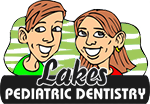Getting your child started on the right track to optimal oral hygiene can be one of the greatest things you can do for them. Teaching them proper brushing and flossing habits at toddler age can prevent your child from having major, potentially painful, issues in the future. Although 100% preventable, tooth decay is one of the most common of childhood diseases. While checkups and cleanings are an essential part of overall health, about 20% of childhood cavities go untreated, according to the CDC (Centers for Disease Control and Prevention). With the help of your pediatric dentist, you can come up with a good plan to ensure your child’s dental hygiene is exactly where it should be, from infancy into adulthood.
Mind the Bottle
Bottles are an everyday thing for infants and toddlers, but what you put in those bottles matters a lot. Once your child is off formula, it’s not uncommon to consider supplementing their diet with various fruit juice-based drinks containing electrolytes and sugar. Thes kinds of drinks can be detrimental, however, due to the amount of sugary liquid that will be passing through their mouths on a daily basis. If you do plan on using certain sugary drinks to help aid your child’s nutrition, consider diluting them, so they are more parts water than sugar. Continue to use this dilution process until your toddler has become accustomed to drinking only water.
Create a Routine
Even though your toddler may only have a couple of baby teeth, they still need proper care! Their gums are especially sensitive at a young age, particularly during teething. While their first baby teeth begin emerging, their gums are most susceptible to contaminants from food, drink, and toys that they are using to soothe teething pains. Make sure you begin cleaning their baby teeth and gums daily with a sterile wet rag. This cleaning method not only helps keep their mouth clean since we know babies love putting everything in there, but it also familiarizes them with the oral hygiene very early on. Also, be sure to disinfect their teething toys regularly since they come into contact with raw and sometimes irritated teething gums.
Good Clean Fun
Once your toddler has reached a certain age and has taken to learning how to brush their teeth, make washing up a fun activity you can do together! This is not only a great way to make sure your child is brushing and flossing correctly, but it’s a nice way to take a couple of minutes out of the day to be silly and step away from the hustle and bustle of baby schedules. Put on a children’s sing-along about brushing and dance together while you both clean your mouths in the morning and before bed. Your child will remember the importance of brushing during these times, especially since often they want to mimic what you are doing. This is a great way to make sure everyone is taking proper care of their teeth.
Avoid Starchy Foods
With how much food is being advertised to young children on television and through other mediums, it can be challenging to tell your child they can’t eat a common snack all of their friends are eating. While some starch-based snacks like puffers designed for babies just starting to eat solid foods are a good route for some parents, things like potato chips, high-sugar cereals and cookies should be saved as occasional treats. These foods are notorious for getting caught in between teeth and causing rapid tooth decay. If these foods are eaten, make sure your child can brush their teeth soon after eating, or at least drink and swish some water in their mouth to prevent particles from lodging in between teeth and gums.
Curb Sugary Drinks
Along with starchy foods, sugary drinks are a major culprit in causing early childhood cavities. The sugar left on teeth after consuming sugary drinks or starchy, sugar-laden snacks is food for bacteria that turns into tooth decay. While fruit juices are advertised as healthy, it’s important to note that they are still packed with a lot of sugar. Consider diluting your child’s choice of juice often to prevent them from consuming so much sugar in their daily diet. This also includes sports drinks and electrolyte enhancement drinks, which have been found to contain an alarming amount of sugar.
Choose Dairy
Tooth enamel is an important guard against cavities, but it can be worn down over time if someone has a very limited or highly acidic diet. The casein in dairy foods is a great way to keep enamel strong. Feed your child dairy snacks like yogurt, cheese, and milk to help build and maintain their tooth enamel. Dairy foods are also basic on the pH scale, helping neutralize the acidity in their mouths. High acidity is another culprit in creating an unhealthy environment in the mouth that can help cavities grow.
Find a Pediatric Dentist by Age 1
By introducing your child to a positive and cheerful pediatric dentist’s office at an early age, they will associate dental health with good memories and feelings. Many adults with dentist-related phobias often had irregular dental checkups or bad experiences early on. This unfortunate circumstance affects many adults who simply choose to avoid dentists all together until there is a dire emergency involving very painful and extensive procedures. No one wants that for their child future, so it’s important to foster a good relationship between your toddler and their pediatric dentist early on into their late teens.
If you are curious about your infant or toddler’s first dental visit, call our friendly front desk to schedule a tour of our modern and child-friendly office. We would be happy to show you around and put your mind at ease in case you have any questions regarding your child’s current or future dental health.
 Directions
Directions
